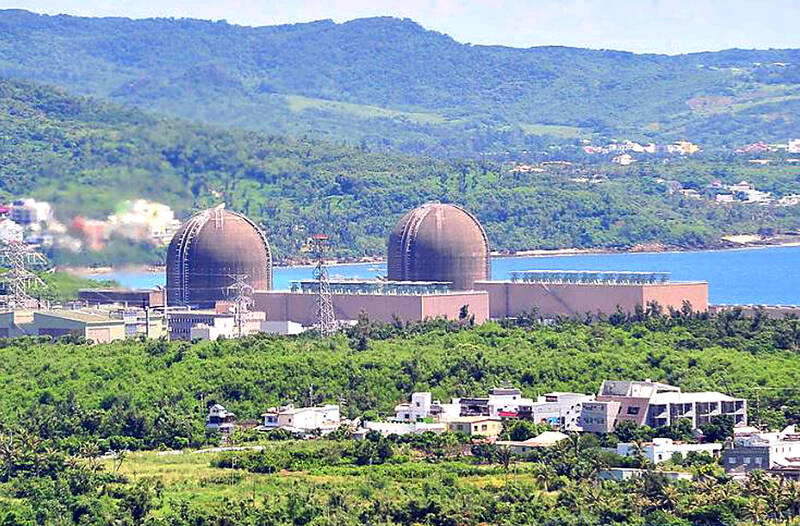The Democratic Progressive Party (DPP) yesterday said that its stance on a “nuclear-free homeland” remains unchanged.
Vice President William Lai (賴清德), the DPP’s candidate for next year’s presidential election, at a forum on Sunday said that government agencies were studying the feasibility of maintaining closed nuclear reactors so they could be restarted in case of an emergency.
This led to speculation that President Tsai Ing-wen’s (蔡英文) promise of a nuclear-free Taiwan by 2025 might not be fulfilled.

Photo: Tsai Tsung-hsien, Taipei Times
Chen Shih-kai (陳世凱), spokesperson for Lai’s election campaign, yesterday said that Lai’s remarks were in response to a student’s question: If Taiwan got into an extreme situation such as a war or a blockade, how can the energy gap be filled?
Lai’s answer was based on a hypothetical situation in which national security is at risk due to “extreme” external conditions, Chen said.
Taiwan should boost its energy self-sufficiency, Lai said, adding that it should develop plans to respond to emergencies and extreme situations.
Decisions made during unusual and extreme situations require social consensus, he said.
Lai did not mention or support extending the use of the Jinshan Nuclear Power Plant in New Taipei City’s Shihmen District (石門) or the Guosheng Nuclear Power Plant in New Taipei City’s Wanli District (萬里), the reactors of which have been shut down, Chen said.
DPP spokesman Chang Chih-hao (張志豪) yesterday said that the party’s promise of a “nuclear-free homeland” remains unchanged and the government would continue to develop and increase the ratio of energy from renewable sources.
Lai repeatedly emphasized the importance of renewable energy development and energy self-sufficiency at the forum, Chang said.
It is the DPP’s priority to expand self-sufficient renewable energy and energy storage equipment, to save electricity and reduce consumption, he said.
Premier Chen Chien-jen (陳建仁) has said many times that the goal of a “nuclear-free homeland” is a consensus in Taiwan, Cabinet spokesman Alan Lin (林子倫) said yesterday, adding that it has always been the government’s goal.
New Taipei City Mayor Hou You-yi (侯友宜), the Chinese Nationalist Party (KMT) candidate for the presidential election, yesterday said that if elected, he would ensure nuclear safety and manage nuclear waste.
Nuclear power is one option among the nation’s diverse energy sources that he supports, Hou said, making his first statement on nuclear power as a presidential candidate.
He said he would ensure that energy sources are in line with global trends, and that there would be no shortage of electricity.
Asked about the DPP’s goal of creating a nuclear-free Taiwan by 2025, he said that “it can’t be done, really can’t be done.”
Meanwhile, regarding the Supreme Court’s ruling to uphold the life imprisonment of a man who was initially sentenced to death for setting fire to his rented residence, killing nine people, Hou said that the death penalty is fair, just and in line with public expectations.
“I’m against abolishing the death penalty,” he added.
Additional reporting by Lai Hsiao-tung and Chung Li-hua

Taiwan has received more than US$70 million in royalties as of the end of last year from developing the F-16V jet as countries worldwide purchase or upgrade to this popular model, government and military officials said on Saturday. Taiwan funded the development of the F-16V jet and ended up the sole investor as other countries withdrew from the program. Now the F-16V is increasingly popular and countries must pay Taiwan a percentage in royalties when they purchase new F-16V aircraft or upgrade older F-16 models. The next five years are expected to be the peak for these royalties, with Taiwan potentially earning

STAY IN YOUR LANE: As the US and Israel attack Iran, the ministry has warned China not to overstep by including Taiwanese citizens in its evacuation orders The Ministry of Foreign Affairs (MOFA) yesterday rebuked a statement by China’s embassy in Israel that it would evacuate Taiwanese holders of Chinese travel documents from Israel amid the latter’s escalating conflict with Iran. Tensions have risen across the Middle East in the wake of US and Israeli airstrikes on Iran beginning Saturday. China subsequently issued an evacuation notice for its citizens. In a news release, the Chinese embassy in Israel said holders of “Taiwan compatriot permits (台胞證)” issued to Taiwanese nationals by Chinese authorities for travel to China — could register for evacuation to Egypt. In Taipei, the ministry yesterday said Taiwan

‘LIKE-MINDED PARTNER’: Tako van Popta said it would be inappropriate to delay signing the deal with Taiwan because of China, adding he would promote the issue Canadian senators have stressed Taiwan’s importance for international trade and expressed enthusiasm for ensuring the Taiwan-Canada trade cooperation framework agreement is implemented this year. Representative to Canada Harry Tseng (曾厚仁) in an interview with the Central News Agency (CNA) said he was increasingly uneasy about Ottawa’s delays in signing the agreement, especially as Ottawa has warmed toward Beijing. There are “no negotiations left. Not only [is it] initialed, we have three versions of the text ready: English, French and Mandarin,” Tseng said. “That tells you how close we are to the final signature.” Tseng said that he hoped Canadian Prime Minister Mark Carney

POSITIVE DEVELOPMENT: Japan and the US are expected to hold in-depth discussions on Taiwan-related issues during the meeting next month, Japanese sources said The holding of a Japan-US leaders’ meeting ahead of US President Donald Trump’s visit to China is positive news for Taiwan, former Japan-Taiwan Exchange Association representative Hiroyasu Izumi said yesterday. After the Liberal Democratic Party’s landslide victory in Japan’s House of Representatives election, Japanese Prime Minister Sanae Takaichi is scheduled to visit the US next month, where she is to meet with Trump ahead of the US president’s planned visit to China from March 31 to April 2 for a meeting with Chinese President Xi Jinping (習近平). Japan and the US are expected to hold in-depth discussions on Taiwan-related issues during the